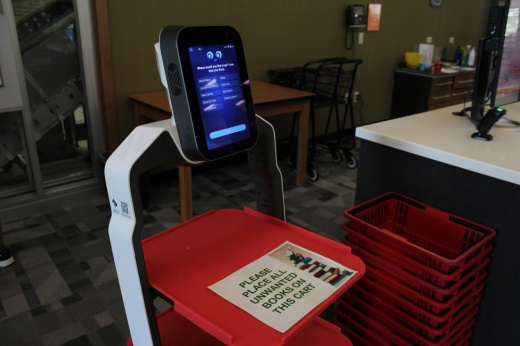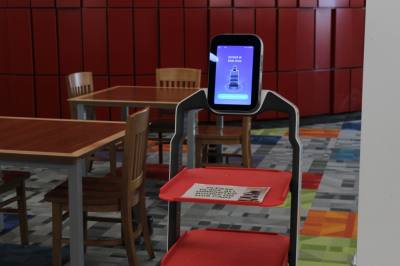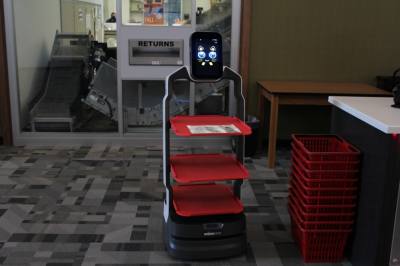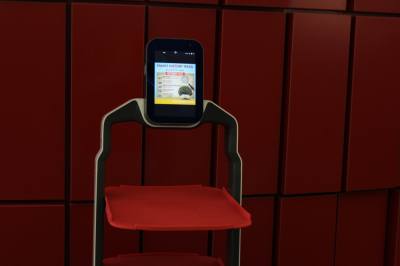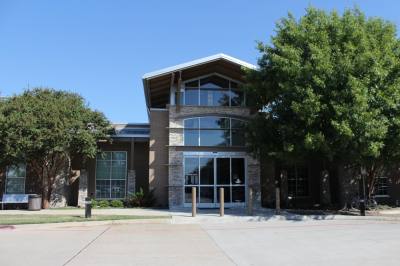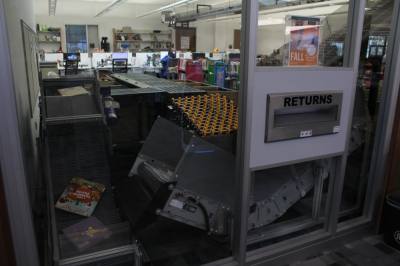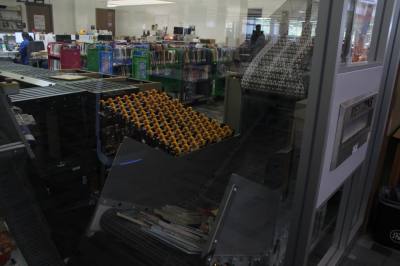The robots are Orion Star Lucki AI delivery robots and are typically marketed for restaurant uses. At the Gay Library, they are being used to help return books to their sections by encouraging guests to place books on the robot rather than leaving it on a book cart, McKinney Director of Libraries Spencer Smith said. This limits the time staff spends collecting books placed on carts and incorrect shelves around the library and instead brings the books in need of reshelving directly to the staff, Smith said.
“Kids actually travel to the robot to put [books] on there. They want to put it on the robot. I think maybe they just pull the book off the shelf to put it on the robot at this point, but we're OK with it,” Smith said.
They are the first robots of this kind being used on a public library floor in Texas, according to a news release. The robots are also being programmed to guide guests to various library sections, and the staff is exploring other capabilities, such as using them for a more gentle approach to closing announcements, according to Smith. He also said the robots were a “surprisingly affordable” investment for the library’s budget and have already drawn attention from guests.
“It's not library technology, but it's technology that exists in the world that we thought we could kind of just tweak a little bit to make use of,” Smith said.
The library is planning to work with the city’s marketing and communications department to coordinate a name selection process for the robots that will include entries from community members.
Several other technological advances are being made at McKinney's libraries. The Gay Library will begin lending out 3D printers, laser engravers, and computer-controlled cutting machines starting in November, Smith said. The tools can be checked out for three-week periods to allow patrons to work on creations off-site. The machines will be housed in 28-inch rolling suitcases for easy transport, can be reserved in advance and must be checked out by an adult over age 18, Smith said.
In addition, the Hall library in downtown McKinney recently deployed an archival-quality scanner for scanning images and documents so users can preserve these items digitally. The scanner is free to use and can also transcribe scanned documents into audio files for visually impaired users.
Both libraries also house STEAM kits, which are educational kits covering the fields of science, technology, engineering, art and math. The kits, contained in backpacks, can be checked out and include topics such as drones, dinosaurs, weather, biology and more. The kits are intended as a learning activity for elementary-age students, Smith said. The libraries are working to double the number of STEAM kits available from 56 to 112. Staff expects the demand to continue to grow, prompting the libraries to add more in the future, Smith said.
New education opportunities are also coming for community members. They will soon be able to remotely access more than 15,000 LinkedIn Learning courses, Udemy courses and over 43,000 videos from a new streaming service that will be available for anyone with a McKinney library card, Smith said.
The library’s growing emphasis on investing in technology stemmed from community growth and demand, Smith said. The Gay Library is “one of the busiest libraries in the state” and sees more than 1 million circulations each year, according to Smith. When the library reopened in June 2020 after completing renovations, the library began using an automated materials handler to improve operational efficiency. The handler can accept returns 24 hours a day through the drive-thru drop-off and will automatically check in and sort all items.
“Once we installed it, that saved us about 65 hours a week of staff time that we used to spend checking in [books],” Smith said.
Smith expects to continue finding ways to invest in technology that will improve the library services, he said. One future plan is to learn more about the abilities of drone technology to assist in transporting materials between branches and for homebound delivery services, Smith said.
Find out more about these programs and the McKinney libraries here.




